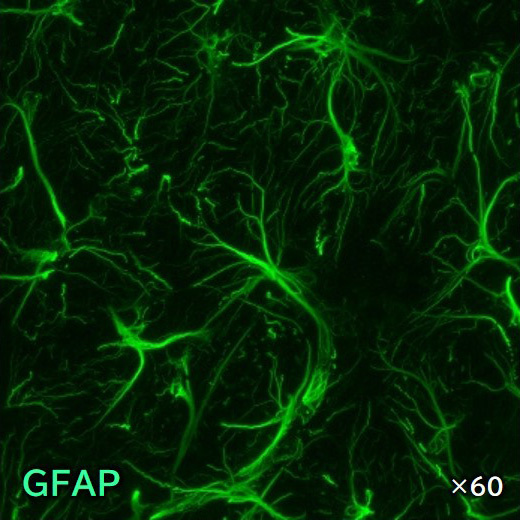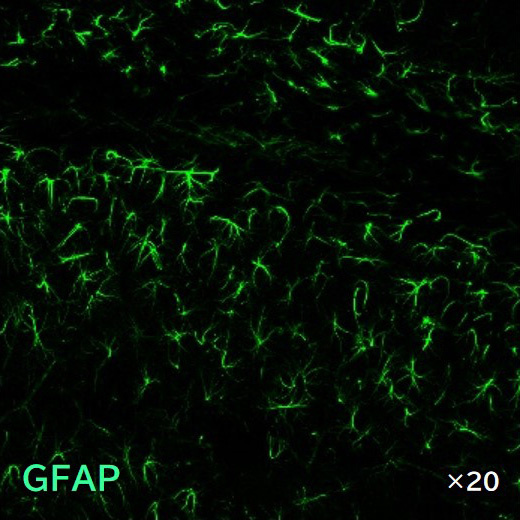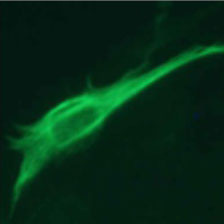Anti GFAP Antibodies
Glial fibrillary acidic protein (GFAP) is an intermediate filament protein with a molecular weight of approximately 50 kDa. GFAP is widely recognized as a marker for astrocytes, as it is primarily expressed in these cells within the central nervous system. It is thought to play a role in the structural organization of astrocytes. Previous studies have also shown that it is essential for the proliferation of reactive astrocytes and the formation of glial scars. GFAP expression is known to increase under such pathological conditions compared to the normal state.
Fujifilm Wako's "Anti GFAP, Monoclonal Antibody(MO389)" is a mouse monoclonal antibody against GFAP. It is suitable for astrocyte staining in both immunohistochemistry and immunocytochemistry.
What is GFAP?
Glial fibrillary acidic protein (GFAP) is an intermediate filament protein with a molecular weight of approximately 50 kDa. It was initially isolated from brain lesions in patients with multiple sclerosis1). GFAP is widely recognized as a marker for astrocytes, as it is primarily expressed in these cells within the central nervous system. Additionally, GFAP expression has been reported in other cell types, such as neural stem cells in the hippocampus.
GFAP is thought to play a role in the structural organization of astrocytes. Previous studies have also shown that it is essential for the proliferation of reactive astrocytes and the formation of glial scars2-3). Reactive astrocytes are cells that undergo morphological changes—such as process elongation and cellular hypertrophy—in response to central nervous system injury caused by trauma or neurodegenerative diseases. GFAP expression is known to increase under such pathological conditions compared to the normal state2-3). Moreover, circulating GFAP has attracted attention as a biomarker that reflects neuroinflammatory states in neurodegenerative diseases, including Alzheimer’s disease.
Anti GFAP, Monoclonal Antibody(MO389)
Anti GFAP, Monoclonal Antibody(MO389) is a mouse monoclonal antibody against GFAP. It is suitable for astrocyte staining in both immunohistochemistry and immunocytochemistry.
Antibody Information
| Clonality | Monoclonal |
|---|---|
| Antigen | Synthetic peptide (CQIRETpSLDTKS) |
| Host | Mouse |
| Formulation | PBS, 50% Glycerol |
| Conjugate | Unconjugated |
| Cross-reactivity | Human, Mouse |
| Application | Immunocytochemistry 1:1,000 Immunohistochemistry 1:500 Western Blotting 1:10,000 |
Application Data
Immunohistochemistry

Species: Mouse
Site: Thalamus
Sample: Frozen section
Antibody concentration: 1:500

Species: Mouse
Site: Hippocampus
Sample: Frozen section
Antibody concentration: 1:500
Immunocytochemistry

Cell line: U251 (Human astrocytoma)
Antibody concentration: 1:1,000
References
- Eng, L. et al.: Brain Res., 28(2), 351(1971).
An acidic protein isolated from fibrous astrocytes - Sofroniew, M. V. and Vinters, H. V.: Acta Neuropathol., 119, 7(2010).
Astrocytes: biology and pathology - Pekny, M. and Pekna, M.: J. Pathol., 204(4), 428(2004).
Astrocyte intermediate filaments in CNS pathologies and regeneration
Product List
- Open All
- Close All
Anti GFAP Antibody (Mouse)
For research use or further manufacturing use only. Not for use in diagnostic procedures.
Product content may differ from the actual image due to minor specification changes etc.
If the revision of product standards and packaging standards has been made, there is a case where the actual product specifications and images are different.



